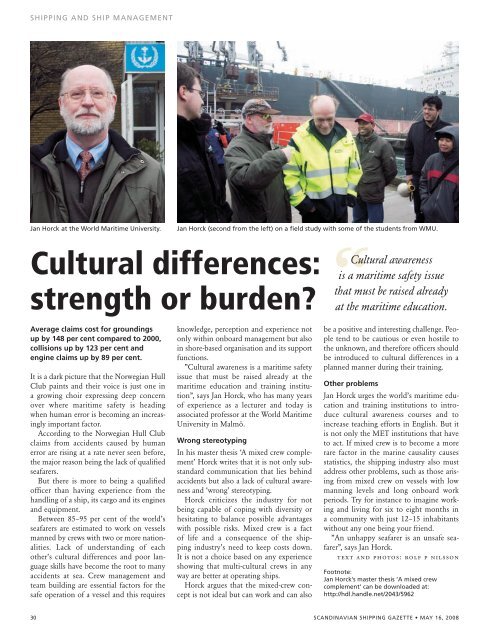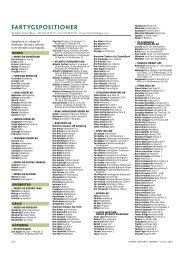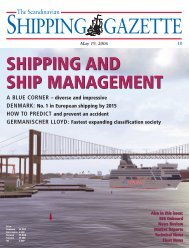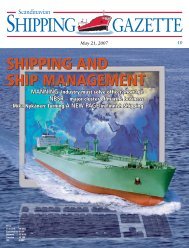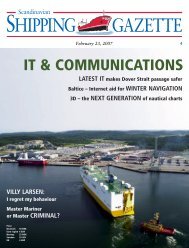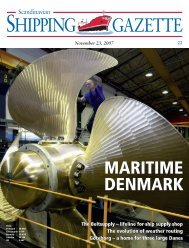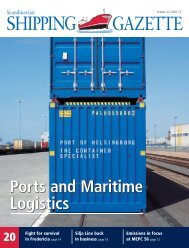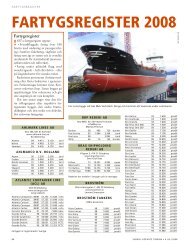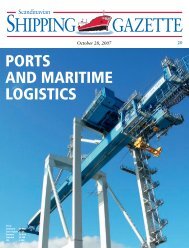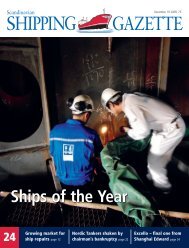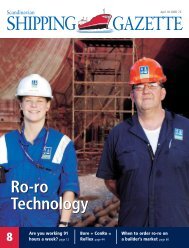SSG No 10 - Shipgaz
SSG No 10 - Shipgaz
SSG No 10 - Shipgaz
- TAGS
- shipgaz
- shipgaz.com
You also want an ePaper? Increase the reach of your titles
YUMPU automatically turns print PDFs into web optimized ePapers that Google loves.
SHIPPING AND SHIP MANAGEMENT<br />
Jan Horck at the World Maritime University.<br />
Average claims cost for groundings<br />
up by 148 per cent compared to 2000,<br />
collisions up by 123 per cent and<br />
engine claims up by 89 per cent.<br />
It is a dark picture that the <strong>No</strong>rwegian Hull<br />
Club paints and their voice is just one in<br />
a growing choir expressing deep concern<br />
over where maritime safety is heading<br />
when human error is becoming an increasingly<br />
important factor.<br />
According to the <strong>No</strong>rwegian Hull Club<br />
claims from accidents caused by human<br />
error are rising at a rate never seen before,<br />
the major reason being the lack of qualified<br />
seafarers.<br />
But there is more to being a qualified<br />
officer than having experience from the<br />
handling of a ship, its cargo and its engines<br />
and equipment.<br />
Between 85–95 per cent of the world’s<br />
seafarers are estimated to work on vessels<br />
manned by crews with two or more nationalities.<br />
Lack of understanding of each<br />
other’s cultural differences and poor language<br />
skills have become the root to many<br />
accidents at sea. Crew management and<br />
team building are essential factors for the<br />
safe operation of a vessel and this requires<br />
Jan Horck (second from the left) on a field study with some of the students from WMU.<br />
Cultural differences:<br />
strength or burden?<br />
knowledge, perception and experience not<br />
only within onboard management but also<br />
in shore-based organisation and its support<br />
functions.<br />
”Cultural awareness is a maritime safety<br />
issue that must be raised already at the<br />
maritime education and training institution”,<br />
says Jan Horck, who has many years<br />
of experience as a lecturer and today is<br />
associated professor at the World Maritime<br />
University in Malmö.<br />
Wrong stereotyping<br />
In his master thesis ‘A mixed crew complement’<br />
Horck writes that it is not only substandard<br />
communication that lies behind<br />
accidents but also a lack of cultural awareness<br />
and ‘wrong’ stereotyping.<br />
Horck criticizes the industry for not<br />
being capable of coping with diversity or<br />
hesitating to balance possible advantages<br />
with possible risks. Mixed crew is a fact<br />
of life and a consequence of the shipping<br />
industry’s need to keep costs down.<br />
It is not a choice based on any experience<br />
showing that multi-cultural crews in any<br />
way are better at operating ships.<br />
Horck argues that the mixed-crew concept<br />
is not ideal but can work and can also<br />
Cultural awareness<br />
is a maritime safety issue<br />
that must be raised already<br />
at the maritime education.<br />
be a positive and interesting challenge. People<br />
tend to be cautious or even hostile to<br />
the unknown, and therefore officers should<br />
be introduced to cultural differences in a<br />
planned manner during their training.<br />
Other problems<br />
Jan Horck urges the world’s maritime education<br />
and training institutions to introduce<br />
cultural awareness courses and to<br />
increase teaching efforts in English. But it<br />
is not only the MET institutions that have<br />
to act. If mixed crew is to become a more<br />
rare factor in the marine causality causes<br />
statistics, the shipping industry also must<br />
address other problems, such as those arising<br />
from mixed crew on vessels with low<br />
manning levels and long onboard work<br />
periods. Try for instance to imagine working<br />
and living for six to eight months in<br />
a community with just 12–15 inhabitants<br />
without any one being your friend.<br />
”An unhappy seafarer is an unsafe seafarer”,<br />
says Jan Horck.<br />
text and photos: rolf p nilsson<br />
Footnote:<br />
Jan Horck’s master thesis ‘A mixed crew<br />
complement’ can be downloaded at:<br />
http://hdl.handle.net/2043/5962<br />
30 SCANDINAVIAN SHIPPING GAZETTE • MAY 16, 2008


